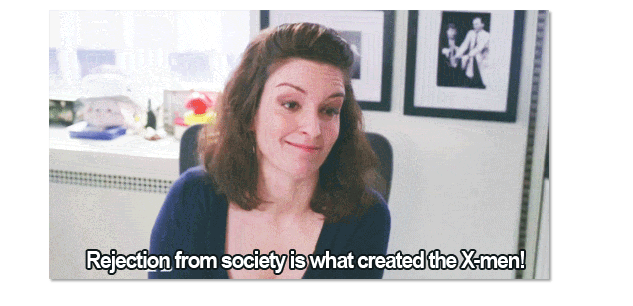How to handle rejection (in comedy): the top 5 ways

As you ponder the path that will help you become a successful comedian, you’re going to have to get used to a few things. One of these is being an unsuccessful comedian, at least for a little while — a subject I covered with a delightful article about how I inadvertently terrified a roomful of Youngs with a simple herpes mention at the mic. Another challenging reality will be rejections. Lots of rejections. So here’s my take on how to handle all those times when you don’t book the gig.
Get a life
I’m not trying to be shady! I mean this quite sincerely and with great love. Is comedy the only thing you think about, or do you have a community surrounding you that is rich enough and nurturing enough to help you sustain these rough ups and downs? If you find yourself obsessing about a recent rejection, reach out to a friend who will understand.
If you don’t have such a friend, get one. Get three. Everyone (your teacher, your aunt, your bank teller) understands rejection in one way or another, but you will find that your circle of artist buddies really gets, better than anyone, what it feels like to put your heart on the line and then not book something. Rejection in comedy can be particularly shaming because you make yourself really vulnerable when you’re trying to make people laugh. So when someone tells you they’re not feeling it, it feels somehow personal.
Make sure that your actor/artist/comedian/poet/musician friends know you have their back. Support your friend when she doesn’t get the role she wanted or when she is rejected for the second time from Jazz Choir. Be there for your squad and they will be there for you.
Comedy may look like a solo endeavor when you’re watching somebody’s Netflix standup special, but a quick Google search will reveal the enormous team and community behind every comedian.
Look for a pattern
Are the yesses and nos you’re getting early in your early career starting to show a pattern?
I studied theater in college. After being roundly rejected from nearly all my auditions in my first two years of school, I unexpectedly booked a wonderful paid show that called for actors who could write, sing, dance, and act. I marveled at this opportunity, because so many of the things I’d auditioned for that year called for me to do only one of those things.
In the years to come, I’d consistently get rejected from shows and opportunities, but whenever writing was in the mix, I’d book the show, the sketch group, the workshop. Once I had the presence of mind to reflect, the pattern became pretty obvious: Writing comedy was the thing that separated me from other aspiring artists; performing the comedy I had written was a close second. Those were the skills that booked me the jobs.
Take a look at your recent yesses and nos. Does a pattern emerge? Can you look at that pattern with a little bit of detachment (I promise, you can be bitter as you want when you’re done reading this article, but just indulge me for a sec)? Let the rejections fall away and take a look at where you are getting those yesses.
Now, to contradict myself. If you are very new to the comedy game, don’t read into your rejections at all. Notice that I was reflecting on my first two years of college when I began to trace this pattern. It may be too soon for you to do that. If that’s the case, just keep on trucking. Your rejections, though they may sting, are basically irrelevant information for you, young squire; right now your job is to build up your endurance and keep getting back in the saddle of the comedy horse that keeps throwing you off. Yes, you can!
Have a ritual
When you work out, you do a warm-up and a cooldown. (Or you should, anyway.) The warm-up is to get your muscles ready, and the cooldown is to return your muscles to normal. Your emotional muscles work in much the same way.
When you prepare for a big audition, for instance, you get your brain and heart working at full capacity. You warm up, prepare for that moment, and give it all you’ve got. One thing I learned recently from a quick interview (aka phone call) with Peak Performance Coach Rae Tattenbaum (aka my mom!) is that after a big show or audition, you need to have a come-down ritual to bring your brain and heart back to a neutral state.
I told my mom that I was having trouble focusing after I had done a big show. I told her that my mind and body still felt like I was performing. I was on edge and couldn’t relax and move on to my next projects, despite their looming deadlines. She told me that I needed to cultivate a cool-down process after shows/events/auditions so that I could bring myself back to a neutral state and start my next projects without what Cal Newport, author of Deep Work: Rules for Focused Success in a Distracted World, calls “attention residue” — the feeling that you’re still kind of doing the last thing you did when you try to start the next thing.
Rejection works the same way. When you get the email or the phone call or you see the cast list posted, have a little ritual or quiet moment planned ahead of time. Honor the effort you put in with a cool-down ritual to thank yourself and just be sad for a little bit if you need to be. The day you’re expecting news, plan ahead for it, and you won’t be blindsided if it’s bad news that comes your way.
Reward the effort, if not the result
My friend had submitted a killer writing packet for a TV show and gone through multiple rounds of interviews. She was very close to booking a job that she had put many hours of work and daydreaming into. After a month of labor and back and forth emails, she called me, heartbroken, with bad news: She was not hired. She confided in me that she felt she might not get over this for a long time. What could she do to put all those lost hours in perspective? What should she do about this terrible feeling that she’d never book anything ever again?
This cuts to the heart of rejection pathos. It’s like cooking a whole meal, smelling it as it comes out of the oven, serving it to diners who get to eat it and then having nothing left for yourself. Rejection can leave you feeling cheated and dissatisfied.
Best way to solve this? Jewelry. Well, costume jewelry.
I told this sad friend what I tell you now: Go buy yourself a little present that will forever remind you of what a great job you did in pursuit of this opportunity. Celebrate what you know to be your success, even if you didn’t get the results you wanted.
My friend bought herself a little silver ring that depicts a hand making the OK signal. She wears it all the time. To her it means, “You done good, kid.” It helped her to close the chapter and, indeed, she did go on to write for a different TV show not long after — with me, no less! Lucky girl!
Follow up
Just because a gatekeeper rejects you in this moment doesn’t mean they always will. It took me three auditions to get into my college’s prestigious sketch-comedy group. Persistence pays off and, along with that, follow-ups pay off. Stay in the network of the people who reject you, if you like them and think you’ve got a future collaborating together. Sometimes you’re not quite ready, or they’re not quite ready for you. Wait it out and when the fates align, your persistence and your follow-ups will pay off.
Rejection is a temporary thing. A temporary thing you hafta go through for a long time. That’s the truth, but it’s no way to end an article! Here’s a picture of a llama with a very cool haircut. In my eyes, you are as brave and as fabulous as this llama. Go forth and make your comedy!

